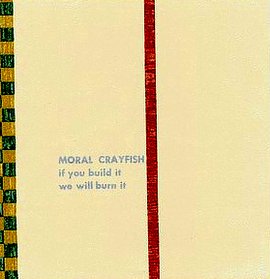Moral Crayfish was the name of my sister’s imaginary rock band when she was in college. My brother John and I stole the name from her when we entered the battle of the bands in high school. We had discovered that by duct-taping a headphone to the body of our younger sister’s viola and plugging it into the mic jack of a boom box we could get distortion and feedback. We also discovered how to “multi-track” by connecting various boom boxes and audio devices together. We started taping over our parents’ collection of Sermons from their former church, the Alliance Bible Church, in San Antonio to make noise tapes. At this time I had little or no knowledge of avant-garde or underground music. It was with joy and a little disappointment when I first heard the works of such artists as Sonic Youth, Dead C, and Richard Youngs on college radio shows from WVUD & WPRB. It was exciting because these artists were pursuing similar sonic explorations; disappointing because we were not doing anything all that new.
In college a friend gave me a Sears electric guitar that survived a house fire, complete with plastic flowers & 90210 stickers on it. One of the conditions of keeping the guitar was that I was not allowed to remove the stickers. By that time in college I had become interested in the work of John Cage, especially his work with prepared piano. I started applying the techniques Cage used for his prepared piano on my guitar. I would shove metal and wooden objects into the guitar strings. Using the feedback of the guitar to move the objects would cause a loop. The feedback would cause the objects to move, and the movement would make a sound which would cause the objects to move again. When I saw Dean Roberts play with his band White Winged Moth my style of guitar playing changed again. Dean Roberts would use a screw driver to twirl against the strings and the body of the guitar. When I adopted his style of playing I learned that you could have a great deal of control with a wider variety of sound possibilities.
My first release featured my own primitive guitar and piano playing, along with field recordings of my family and excerpts from sermon noise tapes I had made in high school. It was called “I feel for you, but I can not find you.” It was released on Dead-Fish Tapes, a tape-only label run by Jason Cammarata of Goat Boy and Disappointed fame.
I recorded Pain’s Temporary Glory on a computer that could barely handle four tracks of audio in Portland, Maine. The title comes from an interview with BMX freestyler Matt Hoffman, who was quoting Evil Knievel. I misread the quote and thought it said “Pain’s Temporary Glory.” The real quote is “Pain is temporary, glory is forever, and chicks dig scars”
After Portland, Maine I moved out to Portland, Oregon--thus fulfilling a dream of living in two separate cities with the same name in one year. I produced “If you build it, we will burn it,” using a Sanyo boom box and toy keyboards. Sanyo boom boxes have the ability of playing two tapes at once, which I then dumped to a third tape deck. I borrowed a four track for final mixings, but the majority of the sound was produced using the more archaic multi-tape deck multi-tracking technique. It was released on Mini-wagonwheel’s (of Rollerball Fame) Nilla Cat CD-R label.
In college a friend gave me a Sears electric guitar that survived a house fire, complete with plastic flowers & 90210 stickers on it. One of the conditions of keeping the guitar was that I was not allowed to remove the stickers. By that time in college I had become interested in the work of John Cage, especially his work with prepared piano. I started applying the techniques Cage used for his prepared piano on my guitar. I would shove metal and wooden objects into the guitar strings. Using the feedback of the guitar to move the objects would cause a loop. The feedback would cause the objects to move, and the movement would make a sound which would cause the objects to move again. When I saw Dean Roberts play with his band White Winged Moth my style of guitar playing changed again. Dean Roberts would use a screw driver to twirl against the strings and the body of the guitar. When I adopted his style of playing I learned that you could have a great deal of control with a wider variety of sound possibilities.
My first release featured my own primitive guitar and piano playing, along with field recordings of my family and excerpts from sermon noise tapes I had made in high school. It was called “I feel for you, but I can not find you.” It was released on Dead-Fish Tapes, a tape-only label run by Jason Cammarata of Goat Boy and Disappointed fame.
I recorded Pain’s Temporary Glory on a computer that could barely handle four tracks of audio in Portland, Maine. The title comes from an interview with BMX freestyler Matt Hoffman, who was quoting Evil Knievel. I misread the quote and thought it said “Pain’s Temporary Glory.” The real quote is “Pain is temporary, glory is forever, and chicks dig scars”
After Portland, Maine I moved out to Portland, Oregon--thus fulfilling a dream of living in two separate cities with the same name in one year. I produced “If you build it, we will burn it,” using a Sanyo boom box and toy keyboards. Sanyo boom boxes have the ability of playing two tapes at once, which I then dumped to a third tape deck. I borrowed a four track for final mixings, but the majority of the sound was produced using the more archaic multi-tape deck multi-tracking technique. It was released on Mini-wagonwheel’s (of Rollerball Fame) Nilla Cat CD-R label.


